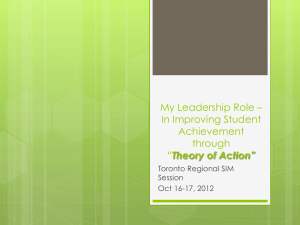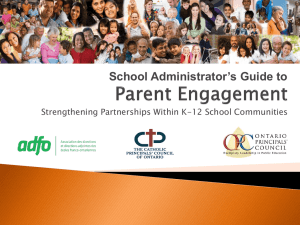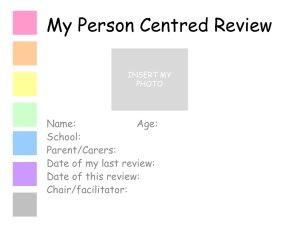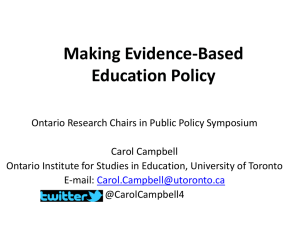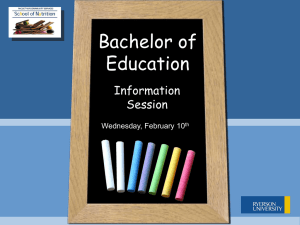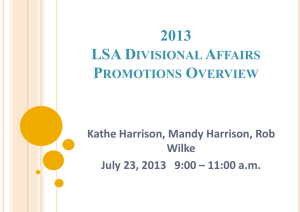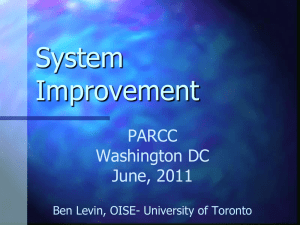Multi-Level Teams to Advance Literacy, Numeracy, and Knowledge
advertisement
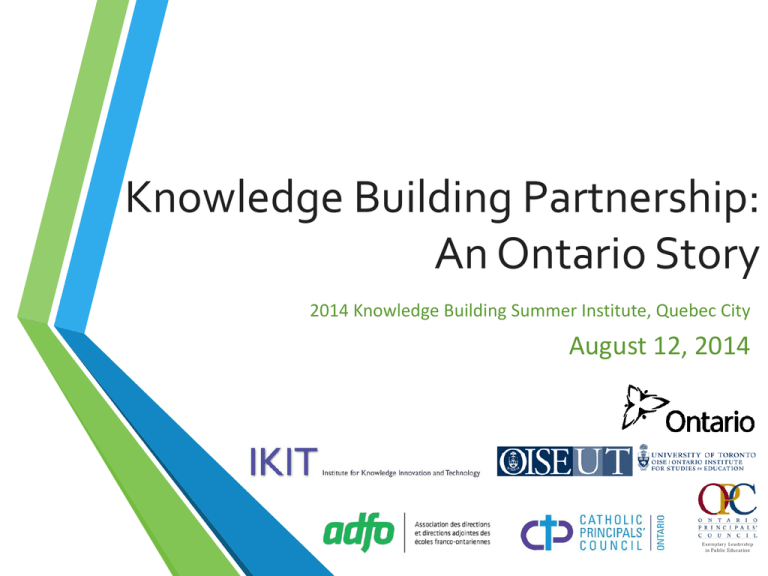
Knowledge Building Partnership: An Ontario Story 2014 Knowledge Building Summer Institute, Quebec City August 12, 2014 SUNG The power of School, University and Government partnerships School University KB Government Government: Ontario Ministry of Education Literacy and Numeracy Secretariat (LNS), Student Achievement Division (SAD): • Bruce Shaw Director, Leadership and Implementation Branch, LNS • Elaine Hine Student Achievement Officer, LNS • Denis Maika Consultant to the Ontario Ministry of Education Knowledge Building Project University: Ontario Institute for Studies in Education, University of Toronto (OISE/UT) Institute for Knowledge Innovation and Technology (IKIT): • Dr. Marlene Scardamalia Director, IKIT • Dr. Monica Resendes Research Coordinator, IKIT Schools: The Three Ontario Principals Associations Leading Student Achievement Project • Ginette Huard LSA Coordinator, l’Association des directions et directions adjointes des écoles franco ontariennes (ADFO) • Mary Cordeiro LSA Coordinator, Catholic Principals’ Council | Ontario (CPCO) • Linda Massey LSA Coordinator, Ontario Principals’ Council (OPC) Ontario’s Story Student Achievement Division, Ontario Ministry of Education Our “K-12 Journey” for the past 10 years: A Small Number of Ambitious Goals • High levels of student achievement o 75% of students with high level of literacy and numeracy skill by age 12 o 85% of students graduating from high school within 5 years of starting grade 9 • Reduced gaps in student achievement • Increased public confidence in education Elementary Outcomes: Achievement Results 150,000 more students at provincial standard 4 key levers for elementary reform: 1. Improving classroom teaching and learning 2. Improving school effectiveness 3. Leadership capacity building 4. Research and evaluation Levers to successful improvement systems 1. 2. 3. 4. 5. 6. 7. 8. A small number of ambitious goals Leadership at all levels High standards and expectations Investment in leadership and capacity building related to instruction Mobilizing data and effective practices as a strategy for improvement (internal/external research) Intervention in a non-punitive manner Reducing distractions Being transparent, relentless and increasingly challenging Achieving Excellence: A Renewed Vision for Education in Ontario Our renewed goals for education are: • Achieving Excellence • Ensuring Equity • Promoting Well-Being • Enhancing Public Confidence http://www.edu.gov.on.ca/eng/about/renewedVision.pdf Knowledge Building Principles and Ontario’s Renewed Vision for Education • • • • • • • • • • • • Real ideas and authentic problems Improvable ideas Idea diversity Rise above Epistemic agency Community knowledge, collective responsibility Democratizing knowledge Symmetric knowledge advancement Pervasive knowledge building Constructive uses of authoritative sources Knowledge building discourse Concurrent, embedded, and transformative assessment University: Ontario Institute for Studies in Education, University of Toronto (OISE/UT) Institute for Knowledge Innovation and Technology (IKIT): • Dr. Marlene Scardamalia Director, IKIT • Dr. Monica Resendes Research Coordinator, IKIT Institute of Knowledge Innovation and Technology (IKIT) Ontario Institute for Studies in Education (OISE), University of Toronto • Researchers • Graduate students • Programmers / Developers • Visiting scholars • International Network Partnership - Dr. Eric Jackman Institute of Child Study • Administration • Teachers • Students • Student-teachers Leading Student Achievement (LSA), Tri-Board projects Participation in: • LSA webinars • Regional sessions and symposia • School site visits o Meet with teachers & principals in schools One-time or repeatedly, if more support is requested o Work with regional student achievement officers o Support with Knowledge Building and Knowledge Forum Provide resources for Knowledge Building; introduce Knowledge Forum; support early experimentation with KB/KF o Engage with students around their experiences (one or two cases) • Interaction with school board research team Goals For The Next Year • How can we better support teachers, students and principals involved in the LSA project? o e.g. — Development of professional learning resources and networks • How can we engage participants as co-designers in teacher/student—researcher—development teams to improve KF? o e.g. — Networks to support addressing user needs, testing tools, refining designs. • What theoretical advances can help inform the adoption and spread of Knowledge Building? o Conceptual models - from Collaborative Inquiry to Knowledge Creation From Inquiry to Knowledge Creation • 1 – Simplistic to complex questioning • 2 – Single source to explanatory coherence • 3 – Teacher-directed to student agency • 4 – Individual inquiry to collective responsibility of community knowledge • Etc… 2005-2015 Our Story Schools: The Three Ontario Principals Associations Leading Student Achievement Project • Ginette Huard LSA Coordinator, l’Association des directions et directions adjointes des écoles franco ontariennes (ADFO) • Mary Cordeiro LSA Coordinator, Catholic Principals’ Council | Ontario (CPCO) • Linda Massey LSA Coordinator, Ontario Principals’ Council (OPC) Partnership and Leadership • Association des directions et des directions adjointes des écoles franco-ontariennes (ADFO) • The Catholic Principals’ Council of Ontario (CPCO) • The Ontario Principals’ Council (OPC) • In partnership with and funded by the Student Achievement Division, Ministry of Education • Supported by Curriculum Services Canada (CSC) ADFO, CPCO and OPC Participation Districts Principals and their schools Year 1 2005-2006 Year 9 2013-2014 22 57 925 3,333 Leading Student Achievement: Networks for Learning SCHOOL Professional Learning Communities INSTRUCTIONAL LEADERSHIP LEADING STUDENT ACHIEVEMENT INSTRUCTIONAL LEADERSHIP DISTRICT Principal Learning Teams INSTRUCTIONAL LEADERSHIP PROVINCE LSA STEERING TEAM (ADFO, CPCO, OPC, EDU, CSC) Project Research and Evaluation: Dr. Ken Leithwood Professor Emeritus, OISE/UT “The Leading Student Achievement project is unique among efforts across developed countries, at the present time, in approaching leadership development as directly and extensively as it has.” (Leithwood, 2013) LSA Theory of Action Four Paths of Leadership Influence on Student Learning Principal Learning Teams (PLTs): A group of school leaders in a district, usually including at least one system leader, as well, with same purposes as professional learning communities but with a focus on improving their own leadership. PLTs often also help guide district as well as school-level decisions. Northern Districts Pilot • Purpose Moving concept of Knowledge Building to Principal Learning Teams (PLTs) • How Invitational to those interested in exploring this work with colleagues • Supports LSA District Facilitator(s) o Knowledge Forum/Technologies o Ministry and District Resources o Participation in LSA PL Sessions Northern Districts Pilot • Involvement o Thunder Bay Catholic District School Board o Keewatin-Patricia District School Board o Lakehead District School Board • Who o Principals/Vice Principals (Team Leaders/Members) o Teacher Leaders o LSA System Leaders • Next Steps Success Stories and Differentiation Conseil scolaire catholique franco-nord Real story in an elementary school • Collaborative Inquiry in literacy for grade 2 to improve students’ reading performance • Collect data to improve reading • Analyse data and make decisions regarding winning strategies to improve reading • Using collaboration as a tool to ensure student success Success Stories and Differentiation (cont’d) Conseil scolaire catholique franco-nord Real story in a secondary school • Developing the emotional path in a secondary school to improve student motivation, commitment and the graduation rate • Use strategies that enhance emotional well-being and contribute to strong involvement in school work • As a result, student attendance and graduation rates have improved significantly Partnership with « École en réseau » • Collaboration with Dr Thérèse Lafernière and her team to facilitate the use of KF and the philosophy of KB • Participation in virtual sessions and symposium • Sharing French material with the French school boards of Ontario • To ensure a collaborative relationship between small French schools in Ontario and establish pilot projects to implement KB an KF Development of a KB Community by a District PLT (cont’d) “Our work has included both cross-curricular and cross-panel development of strategies and supports for teachers to enhance practice centred around asking students to explore deep and meaningful questions connected to curriculum and the world around us.” “Our story features the principal learning team and our lead teacher’s interactions with teacher learning teams connected to Knowledge Building.” Development of a KB Community by a District PLT Upper Grand District School Board In their own words from: More Real Stories: How LSA Participation Has Improved Leadership, Teaching and Student Achievement (May, 2014) “This story is about the journey that our teams have undertaken to introduce and develop Knowledge Building communities in three secondary schools and one elementary school.” For further information: LSA Web Network (NING) • http://lsanetwork.ning.com (English) • http://reseautagedre.ning.com (French) LSA Website • www.lsaontario.org (English) • www.dreontario.org (French) Curriculum Services Canada • www.curriculum.org (Click on Leading Student Achievement or Diriger la réussite des élèves) Tri-Board Pre-Pilot Project • This project emerged out of collaborative work being done since 2013 between researchers at the Institute for Knowledge, Innovation and Technology (IKIT) at OISE/University of Toronto, Leading Student Achievement, staff in the Literacy and Numeracy Secretariat (LNS), and principals/teachers and researchers in several school districts. • The purpose of this collaboration has been to support teacher and principal professional learning relating to the principles of knowledge building (KB) and to introduce Knowledge Forum. Tri-Board Pre-Pilot Project (cont’d) • Activities for educators relating to this work have included: o Face-to-face and webinar learning sessions o Use of Knowledge Forum (KF) knowledge building software o Support for instructional planning and development These activities took place throughout the 2013-14 academic year, and culminated in a sharing opportunity in May, 2014. What Did This Project Look Like? Tri-Board Pre-Pilot Project • March – June 2014 • 3 district school boards o 10 elementary schools o 2 secondary schools • 2 face-to-face sessions • 3 webinars for capacity building and sharing of ideas/school support visits/KF support • Ongoing research component (internal and external) What Did We See and Learn? • 3 big trends coming out of the work… High Engagement and Excitement • Moving to co-design • Activating Knowledge Building Principles • Activating Knowledge Building Circles • Using Knowledge Forum software…a space where ideas and curiosity live • Sharing thinking and ideas • Improving ideas in a very respectful manner • Contributing to the community knowledge Sharing of Ideas • Students, teachers and administrators using Knowledge Forum in classrooms and in Principal Learning Teams to share and spread thinking and ideas SPREAD Students influencing… Principals influencing… • Students • Teachers • Parents • Principals • Teachers Teachers influencing… • Students • Teachers • Principals • Parents Knowledge Building – Inquiry Based Learning Website http://learnteachlead.ca/en/projects/knowledge-building • Resources • Digital Stories • KB Principles • Case Studies • FAQ • A place for people to share and meet Please Help Us! Our burning question for you…. What advice can you give us as we move forward with the Tri-Board Project and think about our next steps?
